Shadwell Genealogical ServicesHelping you to find your ancestors and to tell their stories |
My own stories - a work in progressEver since I was just a lad I have been fascinated by stories about people in the past, especially my own family's stories. I was an inquisitive child, constantly asking my grandparents about their lives when they were young. Thankfully they would tell me and these stories I remembered. Of course it wasn't until years later that I began delving and, gradually, uncovering new stories by piecing together information which didn't always 'gel' with the stories I'd heard. It's interesting just how often the stories people pass on aren't completely accurate; details have been misinterpreted or, in some cases, fabricated for whatever reason. I have not always made myself popular by 'setting the record straight' as this can be disconcerting for some people but often the truth is infinitely more interesting than the fabrications!
We are all descended from not just one family but from many. Each generation back we go doubles the number of ancestors from whom we are descended. The family historian has a choice to make: to follow back one or maybe two lines or to attempt to trace all lines from whom she or he is descended. Over many years I have opted for and managed the latter approach so that I have now chronicled the lives - and adventures! - of many ancestors, completely disconnected from each other but linked only by a common descendant: me.
So, here are just a few samples of the stories I've managed to piece together over many years.
I wonder what my name should be?
Although my surname is Proctor, this is the maiden name of great-great-grandmother Mary Proctor (Procter), born in Lancashire in 1822 and who, prior to marrying in 1850 had three children, the eldest of whom would become my great-grandfather, Thomas Proctor. We will never know who Thomas' father was nor whether he was a full-sibling to his sister and brother, born before their mother married James Butler. In 1852, like many thousands of others, Mary and James Butler emigrated to Victoria along with Mary's three children, all of them emigrating under the name 'Butler'. Initially the family were involved in shepherding around Pentridge, north of Melbourne, but soon they were off to the goldfields, necessitating an itinerant lifestyle, Mary giving birth to six more children under canvas and no doubt in appalling conditions. Finally the family settled on Peters Diggings, south of St Arnaud, where in 1867 Mary, by now 45, succumbed to peritonitis in a diggings' tent. She was buried at St Arnaud. Possibly as a consequence of young Thomas being on bad terms with his step-father, he abandoned the name 'Butler' and assumed his birth name of 'Proctor'. Young Thomas took to the land, marrying the daughter of Charles Cross, a landowner at Kooreh, and, over the following decades amassed much more land - he was an astute businessman and entrepreneur - married twice and fathered seventeen children. Through his benevolence towards the local community as well as his financial success Thomas became known as 'The Grand Old Man of Kooreh'. Today some of the land he acquired in the district remains in the hands of his descendants. Small wonder that when I was researching the history of the Proctors in the 1990s I chose as the title of my book 'The Grand Old Man of Kooreh'. A 'rags to riches' story, yes, but I still find myself wondering....just what should my surname really be?!
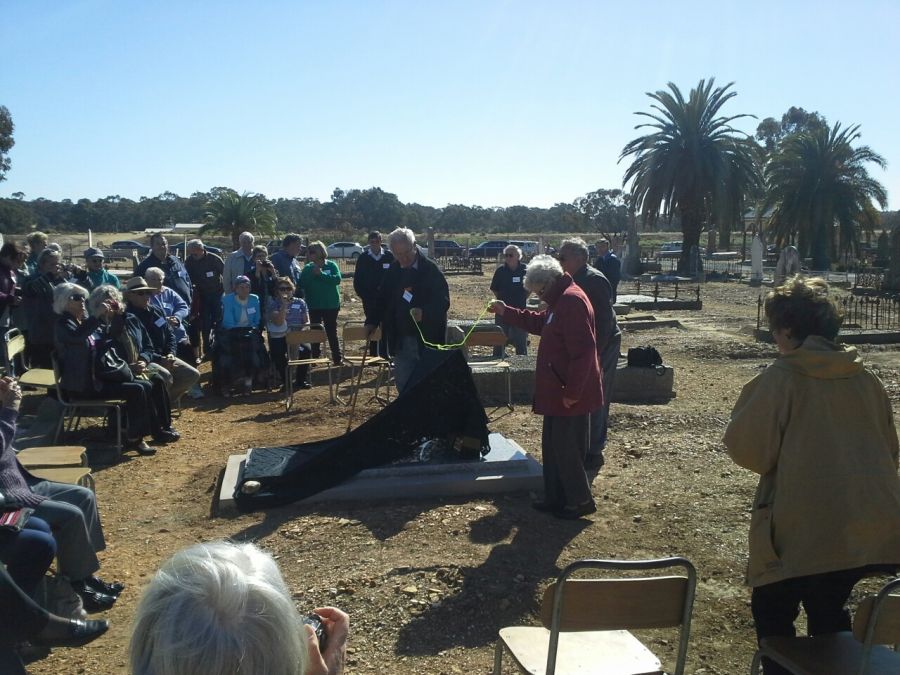 27 April 2014, some 100 people gather in the St Arnaud Cemetery to commemorate
the life of ancestress Mary Butler née Procter with the unveiling of a headstone on
her grave, 147 years after her death.
"Put them to music"
Some twenty years in the making, the story of my Knight ancestors is the one of which I'm probably the proudest. Great-great-great-grandfather Richard Troy Knight was born in London in 1830, the son of a hairdresser who had come from Herefordshire to the St Pancras district of London. 'Troy' was barely out of his teens when he left for the colonies alone, arriving in Adelaide in 1849. Troy took part in Tolmer's Gold Escort from the diggings in Victoria to Adelaide but he was, first and foremost, a musician and entertainer. On the stages of the colonial theatres in Adelaide, Melbourne and Hobart - but also in San Francisco - he entertained with his banjo and as 'Bones', his minstrel character. Marrying Mary Cookson, the daughter of early immigrants to South Australia, John and Elizabeth Cookson, in Adelaide in 1852 did not force Troy to settle down. In the ensuing years Troy and Mary and their thirteen children followed the goldfields and the music hall circuits, performing as the 'Troy Knight Family Singers', most of the children being singers or dancers. Perhaps unlike a lot of people who were driven by the economic imperative, Troy believed that his children should be 'put to music'. Occasionally Troy would try his hand at gold mining but frequently he set himself up as a publican - at Natimuk, at Horsham, Ararat and elsewhere. Ever the one to diversify, Troy also established himself in Collingwood, Melbourne, as a tailor. Following Mary's death in Melbourne in 1891, Troy continued to travel, visiting some of his daughters in Sydney and New Zealand. He settled finally in Sydney where he died in 1912. On a visit to London in 2007 I was able to locate - after much research - the house in St Pancras in which Troy had spent his youth prior to emigrating. Thankfully this fascinating ancestor had a daughter who had the foresight many years ago to chronicle her father's life and this massive document is rich in detail not only about Troy's wanderings but also about the colonial theatre scene. Troy also wrote an autobiographical item for a Sydney newspaper ten years before he died. If only all of our ancestors had had the foresight to leave behind trails for us to follow when piecing together their lives!
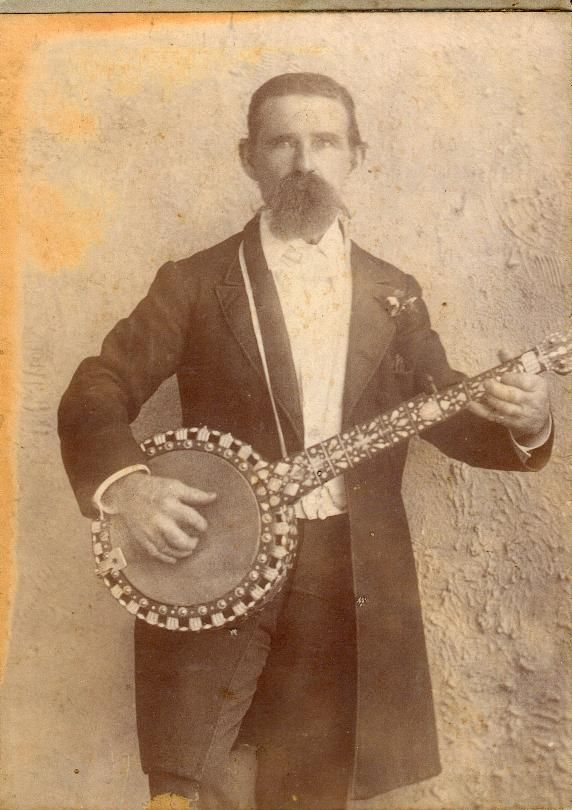 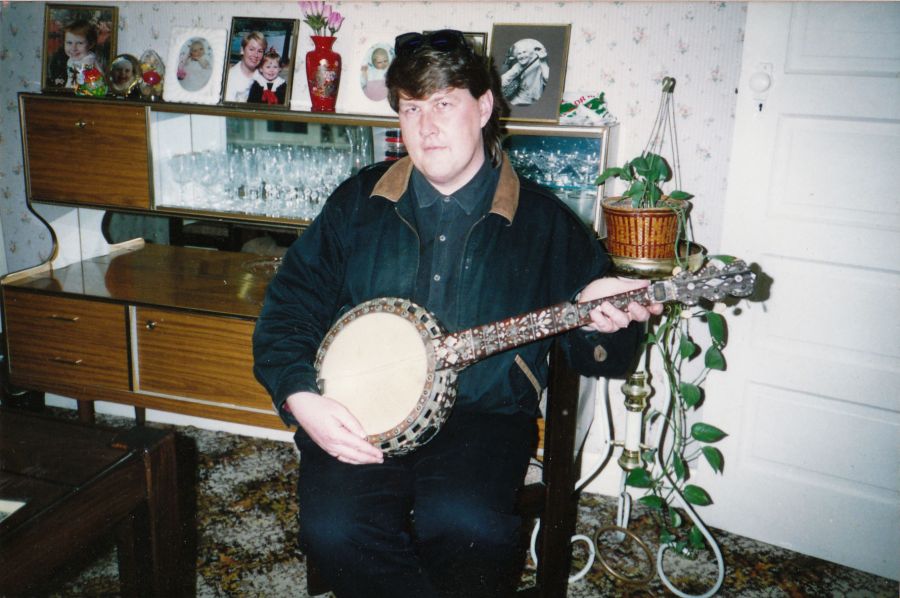 Great-great-great-grandfather Troy Knight, entrepreneur and entertainer, with his banjo and, above, me with the same banjo. Just one of the joys of the journeys on which my research has taken me!
Poor Eliza
Poor Eliza Benton! For many years this great-great-grandmother held a special place in my heart. Unravelling her life-story was one of my earliest attempts at joining the dots genealogically. Born in London in 1825, Eliza emigrated to Wellington, New Zealand in 1841 along with her parents, Timothy and Mary Benton, and siblings. Timothy was a sawyer by trade but at Wellington he turned his hand to farming, his farm being on the land which today forms the Karori Cemetery. In 1843, when just seventeen, Eliza married George Christopher Brown and they left New Zealand for New South Wales before moving south to the Port Phillip District. Many years later great-great-great-grandfather Timothy Benton would disinherit his daughter Eliza although the reason for this has never become clear. Had she and George eloped? Had father and daughter become estranged? By 1852 the Browns were living at Castlemaine and a few years later at Heathcote. Tragedy struck one day in 1860 when George and his young son were carrying a load of supplies from North Melbourne to the Bendigo goldfields. Overnighting beside their wagon at Elphinstone, George was 'run over' by another wagon and succumbed several days later. Eliza heard of her husband's accident and subsequently of his death via a traveller returning to North Melbourne. The following year at Heathcote Eliza married Nova-Scotian Peter Hubert - considerably younger than Eliza - and they would remain together for more than forty years. It had long been a mystery why Eliza on her second marriage certificate stated that she was a spinster with no children; she was a widow and had had, in fact, eleven children! Obviously here was a story needing to be unravelled. Subsequently Eliza and Peter moved to Bendigo where they remained and died, Eliza in 1902. For many years I had been intrigued by this ancestress who had spent her youth in Regency London, emigrated to New Zealand when a young woman and thus would have lived through the turbulent years of European-Maori conflict, who had then left her family for Australia, being widowed in her thirties and then marrying a younger man. She had borne fourteen children, eight of whom did not survive infancy. While living in Bendigo in 1991 I found myself visiting Eliza and Peter's grave almost daily; I would often sit beside their headstone contemplating the life my ancestress had lived.
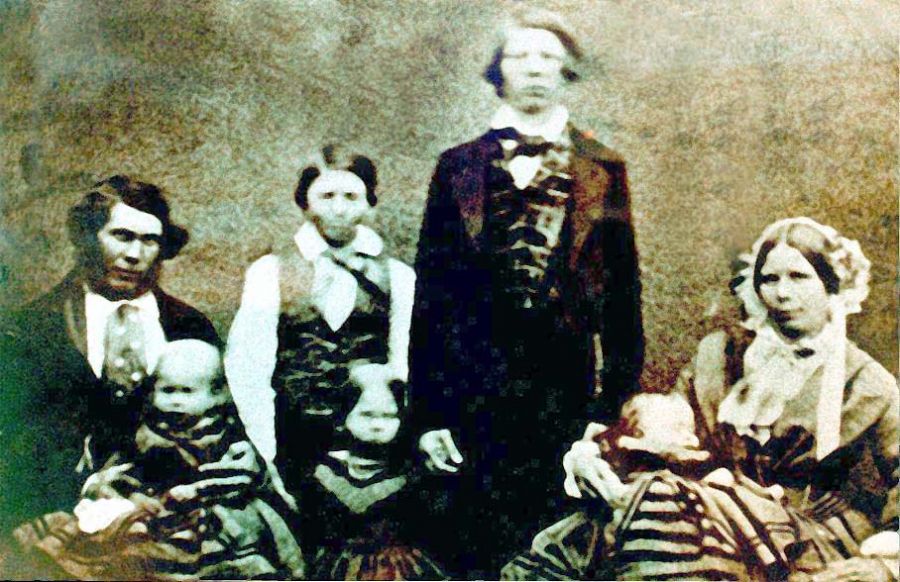 The only photo of Eliza and George Brown and the earliest family
photo in my collection, dating from around 1858.
Going 'home'
How fortunate I am to be able to combine two of my passions: genealogy and travel. All of my ancestors originated in England, Scotland and Ireland, those who emigrated to Australia all arriving between 1847 and 1862, with some going to New Zealand in 1841. With my ancestors having all come from Britain and Ireland I have been able to make 'pilgrimages' to my ancestral homes: to London; to Stromness and Kirkwall in the magical islands of Orkney in the North Sea; to Edinburgh and Perthshire; to Kells and Connor in County Antrim; to Lancashire, Lincolnshire, Somerset, Staffordshire, Hampshire and other locales. I have walked the village streets they walked; I have sat in the churches in which they were baptised, married and worshipped; I have strolled around the cemeteries in which still nameless ancestors were buried hundreds of years ago; I have heard the accents with which they would have spoken; I have seen the landscapes across which they would have trudged and ridden; I have walked down country lanes their feet would have known so well. Doubtless I have also walked past strangers in towns and villages who were distantly related to me! My genealogical pursuits over many years have also resulted in me tracking down and corresponding with newly-found distant kinsfolk. Yet my travels connected with genealogy have not all been overseas. I have travelled to parts of Australia to meet long-lost relatives who, by and large, have become some of my closest friends, possibly because of our shared interest in our ancestors. These are the just some of the marvellous consequences of genealogical research which we don't contemplate - until they happen to us.
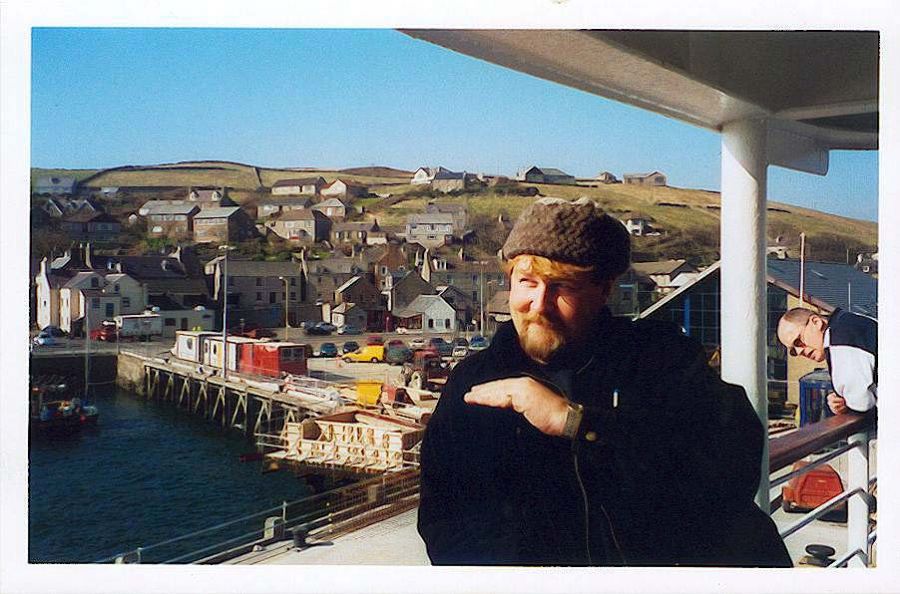 Farewell to Stromness, Orkney, ancestral home of the Louttits & Cloustons, 2002
|